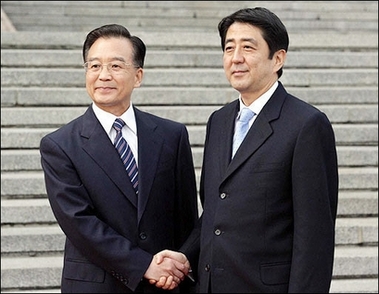BEIJING - China joined Japan in sending a strong message Sunday that
a nuclear test by North Korea "cannot be tolerated," and Pyongyang appeared to back
down from its threat as an important anniversary passed without any sign of
nuclear activity.

New Japanese Prime Minister Shinzo
Abe (R) shakes hands with his Chinese counterpart Wen Jiabao prior a
welcome ceremony at the Great Hall of the People in Beijing. A united
China and Japan kept up pressure on North Korea following landmark talks
overshadowed by global jitters at the Stalinist regime's stated plan to
test an atom bomb. [AFP] |
The estranged neighbors, holding their first summit in five years, put aside
their differences over visits by the Japanese prime minister's predecessor to a
Tokyo war shrine to issue a joint warning to North Korea.
"We agreed that a nuclear weapon test by North Korea cannot be tolerated,"
Japanese Prime Minister Shinzo Abe, who assumed office just two weeks ago said
at a news conference after a day of meetings with President Hu Jintao and other
Chinese leaders. "We need to prevent a nuclear North Korea."
The common ground Japan and China found over North Korea came as a South
Korean politician said a North Korean nuclear test was not imminent and the
North was ready to drop its plans if Washington engaged in direct talks.
The United States has refused to meet with North Korea outside of stalled
negotiations by the Koreas, the United States, Japan, China and Russia.
Washington has said it would have bilateral talks with North Korea only in the
context of those six-party talks.
" President Bush and administration officials have made our position on
bilateral talks clear," said Emily Lawrimore, a White House spokeswoman. "We
will continue to encourage North Korea to participate in six-party talks."
Abe said China was determined to bring the North back into the talks aimed at
getting it to abandon development of nuclear weapons and the long-range missiles
it needs to use them.
"We saw eye-to-eye," Abe said. "I think that was very significant."
North Korea announced last week that it would conduct a nuclear weapons test.
Though the North has long claimed to have nuclear weapons, the test would be the
first incontestable proof of its capabilities.
Analysts had speculated that North Korea might test as early as Sunday
because it often uses anniversaries or other international events to stage
provocations.
Sunday was the ninth anniversary of North Korean leader Kim Jong Il's
appointment as head of the Korean Workers' Party. Tuesday will be the 61st
anniversary of the party's founding.
And South Korean Foreign Minister Ban Ki-moon was expected to be nominated by
the U.N. Security Council to be the world body's next secretary-general on
Monday.
But there were signs the North was using the threat as a bargaining chip.
Former South Korean lawmaker Jang Sung-min said Sunday in Seoul that the
North informed China it may desist from testing if the United States holds
bilateral talks ¡ª a long-standing demand of the North.
Jang said he got the information from a telephone conversation with a Chinese
diplomat whom he did not further identify.
The U.S. rejection of bilateral talks has not met with universal support
among American foreign policy experts.
"I don't think you restrict your conversations to your friends. At the same
time, it's got to be hard-nosed. It's got to be determined," former Secretary of
State James A. Baker III, who held the post under President George H.W. Bush,
said on ABC's "This Week.
Getting Beijing and South Korea to support energetic diplomacy and
potentially tough sanctions against North Korea is seen as crucial to efforts to
make the isolated regime give up its nuclear weapons program.
China and South Korea have argued for engagement and resisted sanctions, but
North Korea's latest nuclear-test threat has hardened Japan's line.
Japan helped usher a stern statement through the U.N. Security Council on
Friday that urged North Korea to cancel its nuclear test and warned of
unspecified consequences if it did not comply.
"We need to transmit a message to North Korea that unless it revokes its test
plans, it will face further isolation from international society and its
situation will deteriorate," Abe said before leaving Tokyo on Sunday.
The positive tone of Abe's visit to China - his first major test on the
international stage may have caught North Korea by surprise.
China called the summit a positive step toward resolving a bitter rift over
official visits to a Tokyo war shrine and flaring territorial disputes.
Abe, despite a reputation for advocating a more patriotic and powerful Japan,
made China his first overseas trip because of the anger over former Prime
Minister Junichiro Koizumi's repeated visits to the Yasukuni war shrine, which
many in Asia see as a symbol of Japanese militarism.
Abe stuck to his policy of neither confirming nor denying whether he will
visit the shrine. But he said he would "act appropriately" and apologized for
Japan's wartime brutality.
"Japan caused tremendous damage and suffering," he said after meeting Hu.
"But in the 60 years since the war, we have walked a path of peace and
democracy."
Though he offered nothing new, Abe's approach seemed to work.
"This visit is the first by a Japanese prime minister in five years, which
represents a positive turn in our relationship," Hu said after greeting Abe in
the Great Hall of the People.